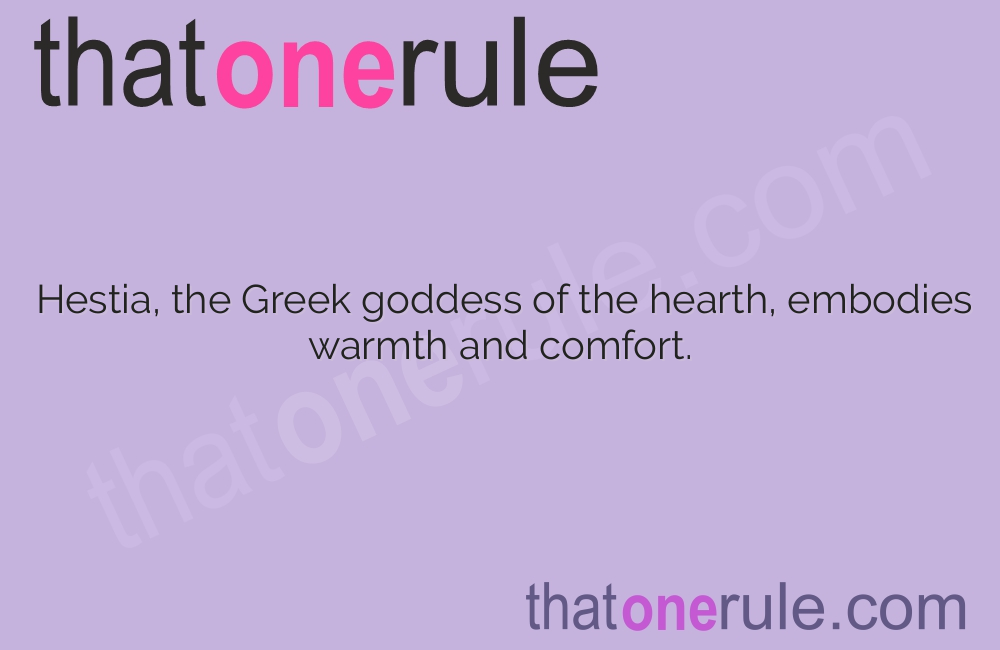Hestia Facts – Discovering the Mythical Goddess of Hearth and Home

Hestia, the Greek goddess of the hearth, embodies warmth and comfort.
Hestia’s sacred flame was said to burn perpetually, symbolizing the importance of home and family.
Hestia was known for her gentle and nurturing nature.
Hestia was the first-born child of Cronus and Rhea.
Hestia willingly gave up her seat on Olympus to Dionysus, showing her selflessness and humility.
Hestia’s presence was believed to bring peace and harmony to the household.
Hestia was honored at the beginning and end of every meal, as the goddess of the hearth and the hearth fire.
Hestia was known for her modesty and simplicity.
Hestia’s warmth and protection extended not only to homes but also to temples and public spaces.
Hestia was rarely depicted in Greek art, as her role was primarily domestic.
Hestia’s temples were considered a sanctuary for those seeking refuge.
Hestia was the sister of Zeus, Poseidon, Hades, Hera, and Demeter.
Hestia’s eternal flame represented the hearth of the cosmos and the divinity within all homes.
Hestia was often depicted as a veiled figure, representing the mystery and sacredness of the hearth.
Hestia’s constant presence in the home ensured the continuity and stability of the family unit.
Hestia’s significance in ancient Greek society was highlighted by the fact that she had a prominent place in every ancient Greek household.
Hestia Facts – Discovering the Mythical Goddess of Hearth and Home part 2
Hestia’s role as the guardian of the hearth meant she was responsible for keeping the sacred fire burning.
Hestia’s flame was believed to have the power to cleanse and purify.
Hestia’s flame was a source of inspiration for poets and artists, symbolizing the creative spark within individuals.
Hestia’s gentle demeanor made her approachable and comforting to those in need.
Hestia’s eternal flame was seen as a link between mortals and the gods.
Hestia’s hearth was a place to gather, share stories, and find solace.
Hestia’s role as the goddess of the hearth made her an important figure in domestic rituals and ceremonies.
Hestia’s flame was said to burn brighter during times of celebration and joy.
Hestia’s eternal flame provided a sense of security and protection for the household.
Hestia’s presence in the home was believed to ward off evil spirits and bring good fortune.
Hestia’s flame was a reminder of the importance of maintaining balance and harmony within the home.
Hestia’s quiet strength and stability were highly regarded by the ancient Greeks.
Hestia’s flame was an offering to the gods, representing the appreciation and gratitude of mortals.
Hestia’s role as the goddess of the hearth reflected the importance of the home as the center of Greek life.
Hestia’s warmth and comfort extended not only to humans but also to animals, as she was often depicted surrounded by domesticated creatures.
Hestia’s sacred fire was believed to have healing properties.
Hestia’s flame was associated with purity and cleanliness.
Hestia’s role as the keeper of the hearth fire was passed down through generations, ensuring the continuity of her divine presence in homes.
Hestia’s eternal flame was believed to be a connection to the divine world.
Hestia’s modesty and simplicity were seen as virtues to emulate.
Hestia’s role as the goddess of the hearth was seen as essential for the survival and well-being of the household.
Hestia’s flame was a symbol of hope and renewal.
Hestia’s gentle presence brought calmness and serenity to a chaotic world.
Hestia’s eternal flame was a source of comfort for those in need.
Hestia’s flame was a reminder to honor the sacredness of the home and the bonds of family.
Hestia’s role as the protector of the hearth made her a guardian of tradition and cultural values.
Hestia’s eternal flame was a symbol of the enduring love and devotion found within families.
Hestia’s warmth and comfort were a source of solace during times of grief and loss.
Hestia’s role as the goddess of the hearth highlighted the importance of domestic life and the nurturing of relationships.

